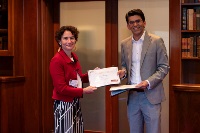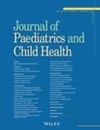Pot-pourri eBulletin - 20 November 2023

I’m very pleased to announce the name of the Howard Williams Medal 2024 recipient: Professor Alistair Gunn. As Professor of Physiology and Paediatrics, a Paediatrician-scientist in the Department of Physiology at the University of Auckland, he has conducted groundbreaking research into the mechanisms and treatment of asphyxial brain injury, identifying compromised foetuses in labour and preventing life threatening events in infancy. His research helped to establish mild cooling as the first ever technique to reduce brain injury due to low oxygen levels at birth, and this treatment is now standard care around the world.
The aim of the Howard Williams Medal is to “recognise a member of the Paediatrics & Child Health Division who has made an outstanding contribution to improving the health of children and young people in Australia and/or Aotearoa New Zealand”. Professor Alistair Gunn (below) is a worthy recipient of such an honour, and I look forward to hearing his oration as part of RACP Congress 2024.

I wrote in the last Pot-pourri about my experience as PCHD President attending the Convocation Ceremony held at Te Papa Tongarewa in Te Whanganui-a-Tara Wellington on 30 September. More recently, on 4 November, it brought me special joy to attend a ceremony in my own hometown of Brisbane, where we saw approximately 180 new RACP Fellows celebrated in the company of 700 family and friends. I would urge any members who are able to attend future ceremonies to do so – they are truly wonderful occasions and a great opportunity to engage with our newest colleagues.
On 30 October I joined a focus group formed by the Department of Health and Aged Care to discuss a feasibility study on options to limit children’s exposure to unhealthy food marketing in Australia. This group is an independent project team led by Associate Professor Bridget Kelly and Professor Kathryn Backholer.
The study aims to:
- consider the nature and extent of Australian children’s exposure to unhealthy food marketing and the impact on diet-related outcomes
- consider the policy landscape governing marketing practices for food and other commodities with marketing controls, including international best-practice
- propose regulatory and non-regulatory policy options
- consider the costs and benefits of policies to limit children’s exposure to unhealthy food marketing and provide recommendations to Government
- consider monitoring and evaluation approaches for marketing on media and in settings.
This meeting was part of a broader consultation process which will also include a public consultation. I will update more as details become available.
On 5 September, as PCHD President I took part in a meeting with the WA Minister for Police and Corrective Services (portfolio also includes Defence Industry and Veterans Issues). The purpose of this meeting was two-fold:
- To advocate for the transfer of young people held at Casuarina Prison (the main maximum-security prison for male prisoners in WA) to an age-appropriate care facility
- To discuss how we can support the WA Government to improve the health and wellbeing of young people in the youth justice system, including those in custody.
This is obviously an issue that is not going to be solved by a single meeting, but it was useful to bring together health experts and advisors to look for ways to work towards viable solutions. I look forward to further discussions in the future.
Professor Nitin Kapur
PCHD President
Please keep an eye on the EOIs page on the College website for vacant positions on PCHD Committees.
All Expressions of Interest
The Australasian Society of Clinical Immunology and Allergy (ASCIA) was established in 1990 as the peak professional body of clinical immunology/allergy specialists in Australia and Aotearoa New Zealand. ASCIA is a member society of the World Allergy Organisation (WAO) and is affiliated with The Royal Australasian College of Physicians (RACP) as a specialty society.
ASCIA’s purpose is to advance the science and practice of allergy and clinical immunology in Australia and Aotearoa New Zealand.
ASCIA aims to promote the highest standards of allergy and immunology training, practise and care by providing online ASCIA website resources, communications, advocacy and AIFA allergy/clinical immunology research grants for ASCIA members. ASCIA website online resources attract approximately three million page views and two million visits from 1.5 million users (unique visitors) each year.
ASCIA provides wide ranging education and training opportunities in allergy and clinical immunology for ASCIA members, other health professionals, patients, carers, and community.
ASCIA Annual Conferences are held in early September each year, and have become even more successful since they transitioned to hybrid in 2022, to enable greater access to CPD. Another source of CPD are ASCIA e-training courses, and there have been more than one million registrations since they were first introduced in 2010.
ASCIA members work together with other organisations, including patient/carer, professional and research groups to increase the profile of allergy and clinical immunology and improve health outcomes. An example of a successful collaboration is TAPID (Transplantation and Primary Immunodeficiency) which was commenced by ASCIA in 2013.
In recent years ASCIA has worked on developing National Strategies for Allergy and Immunodeficiency, which are now being implemented through the ASCIA Immunodeficiency Strategy and National Allergy Council. These collaborative strategies will be major priorities for ASCIA in the next few years.
ASCIA acknowledges the voluntary expertise contributed by ASCIA Directors (Associate Professor Theresa Cole, Dr Michael O’Sullivan, Associate Professor Jane Peake, Dr Kathryn Patchett), ASCIA Council and other ASCIA members, who work with the ASCIA CEO (Jill Smith), ASCIA staff and contractors to contribute to ASCIA’s initiatives, resulting in ASCIA providing world leading online resources and meetings.
There are currently 749 ASCIA members, which includes 280 clinical immunology/allergy specialists, 79 advanced trainees and 136 other medical practitioners. This is a significant increase since 2007 when there were only 280 ASCIA members in total. ASCIA welcomes RACP Fellows and other health professionals working in allergy and immunology to join ASCIA.
Advanced Training Curricula Renewal Wave 2 consultation will take place over the next seven weeks, with seven paediatric curricula available for consultation. Participating in this process qualifies for CPD hours in category 2, specifically related to performance assessment.
You'll receive an invitation to join the consultation via email in the next two weeks. The deadline for providing your input is the first week of January 2024. You can share your feedback through a dedicated online form, or if you prefer, via email, Zoom, or phone.
The following curricula are now open for review:
An additional five curricula will soon be finalised:
For more information, visit the Curricula Renewal pages of the RACP website or contact curriculum@racp.edu.au.
Webinar Series: Chapter of Community Child Health
In lieu of their annual Chapter Satellite Day, this year the Chapter of Community Child Health has created a short webinar series to be held over four dates from October to November 2023. All webinars will be saved as resources via Medflix.
Meanwhile, register now for the last webinar in this year’s series:
- Paediatric Hubs (Dr Niroshini Kennedy) – Thursday, 14 December 6.30pm to 7.30pm AEDT
We would like to congratulate our Paediatric regional representatives, who presented at the 2023 RACP Trainee Research Awards Symposium in August: Dr Michelle Scoullar (VIC), Dr Rachel Roberts (QLD), Dr Jaslyn Ong (WA), and Dr Robyn Silcock (NT).
After the presentations, everybody enjoyed a relaxed dinner with the RACP President, the Dean, the Chair of the Grants Advisory Committee and other guests.
.tmb-thumb200.jpg?Culture=en&sfvrsn=3904d61a_1)


Closing soon: RACP Indigenous Health Scholarships
The RACP Indigenous Health Scholarship Program aims to support those medical graduates and current trainees of the RACP who identify as Aboriginal, Torres Strait islander or Māori on their chosen career path to becoming a physician. The Scholarships provide a funded pathway through Basic, Advanced, Faculty or Chapter training in Australia and/or Aotearoa New Zealand.
Applications close 30 November 2023. Further details on these scholarships are available on the RACP Foundation website.
RACP Trainee Research Awards
Support your trainees by watching them compete at the regional events. The best presenters selected at each regional event are invited to present their work alongside recognised researchers at an RACP event in 2024.
See the RACP Trainee Research Awards webpage for event details.
 The Journal of Paediatrics and Child Health publishes original research articles of scientific excellence in paediatrics and child health. The latest edition is now live and available to view online.
The Journal of Paediatrics and Child Health publishes original research articles of scientific excellence in paediatrics and child health. The latest edition is now live and available to view online.
Articles in this edition include:
- Analysis of trends in retinopathy of prematurity over 5 years in a tertiary neonatal intensive care unit
- First nations infant with complex invasive group A streptococcal disease with pericarditis
- Loss of palpebral tissue
- Are all vesicles ‘monkey related’?
Read the journal
 Semaglutide, branded as Ozempic or Wegovy, is an analogue of
Semaglutide, branded as Ozempic or Wegovy, is an analogue of
glucagon-like peptide 1 which hasglucose-dependent effects on insulin secretion. In this episode we discuss how semaglutide performs as an antihyperglycaemic agent compared to previous GLP-1 analogues and the soon-to-be launched tirzepatide. This dual agonist also binds receptors to glucose-dependent insulinotropic polypeptide, GIP.
GLP-1 and GIP are incretin hormones, secreted after food intake and involved in regulating gastric motility and appetite. The analogue therapies have resulted in weight loss of 10 to 20 percent in trials on patients with obesity or other weight-related comorbidities. For various reasons, however, they remain unsubsidised by the Pharmaceutical Benefits Scheme. This hasn’t stopped social media influencers driving up off-label demand from the wider public, creating a problem for regulators and the diabetic patients most in need.
Guests:
- Professor Chris Rayner MBBS PhD FRACP (Gwendolyn Michell Professor, Adelaide Medical School; Consultant Gastroenterologist, Royal Adelaide Hospital)
- Professor Gary Wittert MBBch, MD, FRACP (Mortlock Professor, Adelaide Medical School; Senior Consultant Endocrinologist, Royal Adelaide Hospital)
Please visit the Pomegranate Health web page for a transcript and supporting references. Login to MyCPD to record learning activity. Subscribe to new episode email alerts or search for ‘Pomegranate Health’ in Apple Podcasts, Spotify, Castbox or any podcasting app.
The RACP 2023 Member Statistics and Insights Report has just been released. This report provides an aggregated snapshot of College membership as at 30 June 2023 using member data from the College’s customer relationship management (CRM) system.
The report displays a range of characteristics of the membership including demographic measures such as age, gender and location, as well as other characteristics such as largest training sites, specialty and more. Additional analysis has also enabled the report to include trend information about various characteristics of the membership over a number of years.
To commemorate our 85-year Anniversary, you're invited to submit your story to our 85 Year Anniversary publication. A total of 85 submissions will be curated into this keepsake publication to showcase the diverse journeys of our members and their personal connection with our College. All submissions will also be published in the College Roll.

Did you know that the ROC (RACP Online Community) features the latest news, events, and updates in your community? The ROC is a secure online forum that enables you to stay up to date with the latest happenings in your College and start discussions which other members can immediately see and respond to. It’s prompt and more accessible than email and helps you to expand your network of contacts across the membership.
Download the app from the App Store or Google Play, or log in via MyRACP.
Find out more
 Take advantage of our amazing offers this November. We bring you savings on automotive, health insurance, tech, whitegoods and more. Log in and save with your Member Advantage.
Take advantage of our amazing offers this November. We bring you savings on automotive, health insurance, tech, whitegoods and more. Log in and save with your Member Advantage.
Member Advantage Australia
Member Advantage Aotearoa New Zealand
View all career opportunities on the RACP website.
To submit an article for publishing in Pot-pourri, please email paed@racp.edu.au. The article should be no more than 350 words. If you would like to submit an image with your article, it would be assumed that you have received appropriate permission to use the photo and it needs to be of high resolution, above 300 dpi. Please note that articles may need to be edited by the RACP Communications Team.